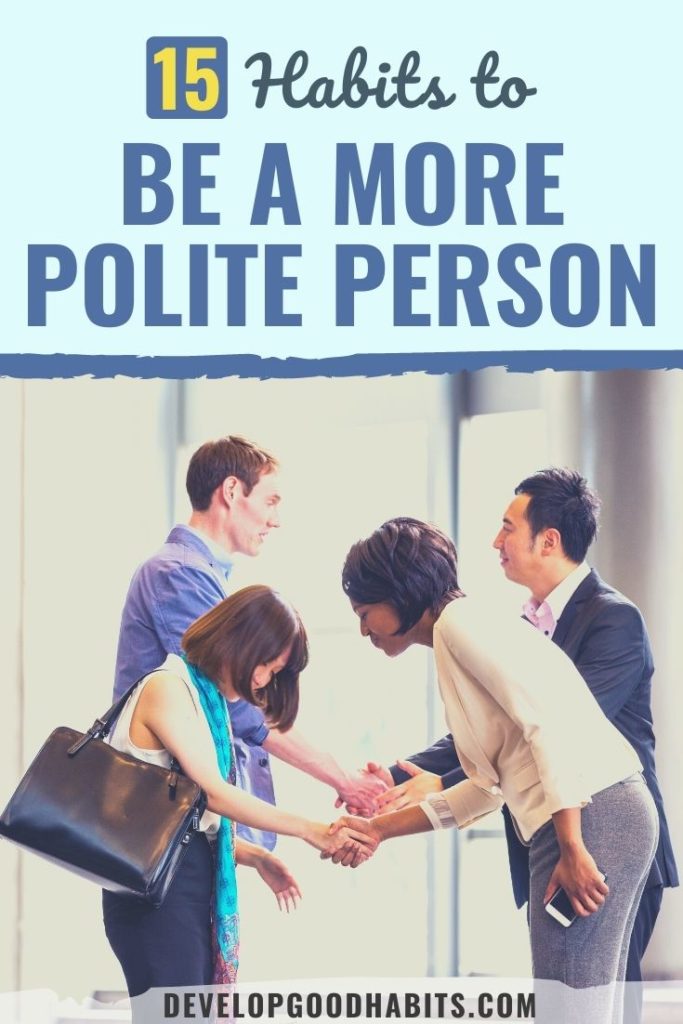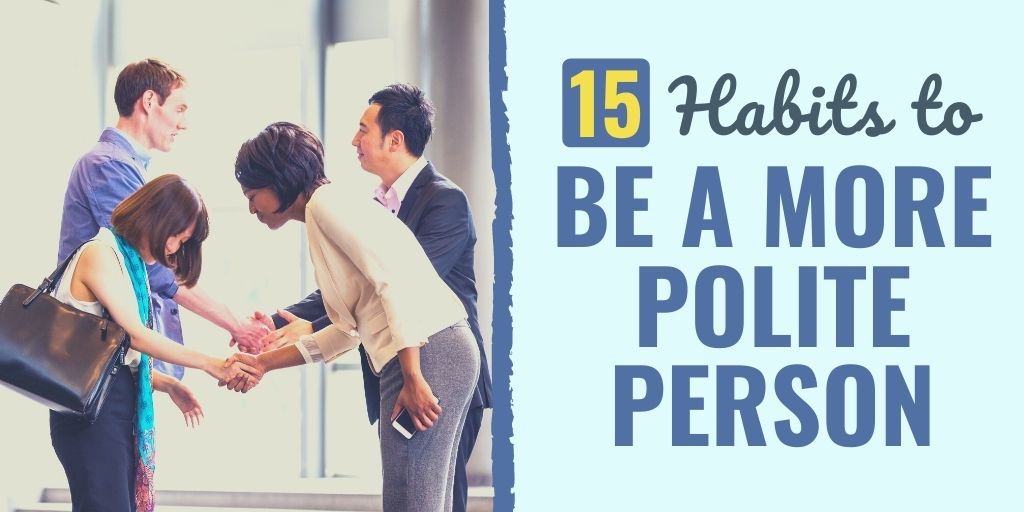There might be affiliate links on this page, which means we get a small commission of anything you buy. As an Amazon Associate we earn from qualifying purchases. Please do your own research before making any online purchase.
“Thank you so much for making dinner.”
“Please, may I have that financial file before the meeting?”
“No, thank you. I’m not available to join you for cocktails after work.”
Do you consider yourself to be a polite person? Or maybe you want to learn how to be (more) polite? The good news is that you can start being polite now and follow in the footsteps of a polite person you admire.
How to be polite starts with these 15 habits; but, first I will share what it means to be polite and the benefits you can reap by doing so.
What Does It Mean to Be Polite?
You may think that a polite person is a “yes, sir/ma’am” person – someone who says “yes and amen” to everything, who wants to help everyone, and who gets walked over by people (aka a doormat). On the contrary, being polite means behaving in a way that is considerate, courteous, respectful, and tactful. Thus, a polite person has good manners and acts in a way to not offend others.
To be polite is to act in a way that’s socially and culturally acceptable, and you show an understanding and sensitivity for other people’s feelings. Essentially, politeness is following the Golden Rule: “treating others as you would want to be treated.”
You can be polite to someone even if you don’t like or respect them. Politeness is about how you act – and you can be respectful even if the other person is rude to you and doesn't deserve your respect.
So if you want to be treated with kindness, you should be kind to others. The potential danger of this (and of being overly polite) is that you can easily become a doormat or a pushover – having people walk all over you because you do nothing. You are more concerned with being considerate of the other person and respectful.
I believe a polite person can still hold their ground (in a polite way, of course). They can set and enforce healthy boundaries where they dictate the terms to how they want to be treated whilst still being polite to others. The trick, obviously, is in the how. Mind what you say and how you say it.
If you are angry, express it in a healthy way. If you have an opinion, share it – in a way that’s socially and culturally acceptable. If you want to say no to something, politely refuse.
A quick note on politeness and culture: Politeness is often entrenched in culture, and what’s seen as polite in one culture may not be considered as polite in another. For example, in Japan, it is polite to accept a gift with both hands and only open it later.
In Kenya, it’s polite to make small talk before “talking business.” In Argentina and Jordan, someone may lean in close while speaking to you and even touch your arm or shoulder during the conversation, while people prefer to keep a personal distance in countries like Sweden.
The Benefits of Being Polite
There are various benefits to being polite, both in personal and professional settings.
Being polite:
15 Habits to Be More Polite
Polite people have personal rules, morals and beliefs they follow so they can always act in a polite way. Follow these habits if you want to be more polite in your day-to-day routine.
1. Use “Please” and “Thank You”
You probably teach your kids that they should be polite and demonstrate this by saying “please” and “thank you.” It’s the same for adults. Saying “please” and “thank you” is simply good manners.

So next time you ask for something, remember to add please. And when you receive something, say thank you (and mean it). There are various benefits to being kind (which costs you absolutely nothing) and being grateful.
2. Make Small Talk, but Stay within Limits
A polite person is a master at making small talk. They’ll remember if their colleague’s kid was sick and ask how they are doing, even if it is a week or two later. However, they know not to ask overly personal questions.
They restrain themselves even if you are curious and dying to know more about someone. Rather let the other person volunteer information than asking and overstepping. If someone wants to share, they will; there’s no need to put them on the spot or force them to share.
3. Ask for Permission
Polite people don’t assume things. They will often ask, “May I?” before acting or making contact with another person. Being polite means being aware that someone may feel uncomfortable, and thus thinking before asking, and thereby taking the other person’s feelings into consideration.
Pro tip: In some cultures, it is acceptable to reach out and place your hand on someone’s arm – briefly – while chatting, so don’t be affronted if this happens to you. And pulling away in this case will make you seem to be impolite and cold, so always beware of culture and how a society views what’s polite.
4. Admit Mistakes
Another aspect of how to be polite is admitting mistakes and when you are wrong. Not being honest about mistakes makes you seem ignorant and arrogant, not smart. (And you can’t always hide a mistake either, so rather be polite and own up.)
No one likes to be wrong, much less admit they’ve made a mistake. But a polite person will acknowledge when they are in the wrong. They take responsibility for what they’ve done, and if they don’t know how to fix it, they’ll ask.
5. Be Gracious
Polite people are also gracious. They may not always like admitting they don’t know, but they’ll ask. And if they receive a correction, they respond graciously.
Asking for help isn’t a weakness. You show people you are human and strong when you ask for help, and they will respect you for being honest. You can show the same kindness when someone else admits they don’t know.
6. Don’t Interrupt Others
A well-mannered person doesn’t interrupt others. Instead, they let a person finish speaking before they reply or add to the conversation. This simple action also means that polite people are good listeners.
Instead of hearing so they can reply, they listen – thinking about what the person is saying so they can add value to the conversation while also responding appropriately (and politely).
7. Make People Feel Comfortable
Putting others at ease is something a polite person has a natural charm for. When you are polite, you notice when others are uncomfortable and why they feel that way. You also act in a way to help an uncomfortable person feel more at ease.
For example, if there’s a new coworker and they look unsure when it comes to lunchtime and where people have lunch, you can ask if they know where the breakroom is or let them know they can join you for lunch in the park or out in the garden.
8. Disagree in a Kind Way
Polite people aren’t pushovers and they do share when they disagree with something. However, it’s the way they disagree that makes the action polite.

When disagreeing, a well-mannered person will keep their tone of voice level and they’ll have a quiet way about them. They don’t roll their eyes at the person they are disagreeing with, and they don’t wave their arms or get in the other person’s space.
9. Have Polite Body Language
The body language of a polite person is, well, polite. Aside from speaking in a polite manner (in the words you choose to use) and keeping your tone of voice quiet and even, your whole posture and mannerisms exude politeness.
You maintain eye contact when you speak to someone (unless this isn’t culturally acceptable), you don’t fiddle with your fingers, buttons on your shirt, or any other object and you have an “open body.”
Open body language is when you don’t cross your knees or arms; you essentially don’t close off your body, because this tells the other person you aren’t interested in what they have to say, and comes across as rude.
10. Say No to Gossip
A polite person keeps their thoughts to themselves because they know how dangerous (and wrong) it is to make and share snap judgments of others, or to pass along tales or gossip they’ve heard.
And just like being polite means you don’t pass gossip along; you don’t listen to it either.
11. Treat Everyone with Respect
If you are polite, you treat everyone the same and with respect. This means that you bestow respect on a person, whether they are the CEO of a Fortune 500 company or whether they are the janitor or mail man.
Treat the bus driver, the clerk behind the counter, and the shop assistant with courtesy and dignity.
12. Don’t Act Passive-Aggressively; Be Assertive
How to be a polite person includes acting assertively and not passive-aggressively. If you are passive-aggressive, you are rude… whether or not you dress up your rudeness in kind or polite words. For example, if you said something unkind, don’t follow up the statement with, “I’m just being honest.”
Be assertive and get over your fear of confrontation. Address difficult topics with respect and politeness.
13. Remember Names
As a polite person, you make a point of it to remember a person’s name when you are introduced. And you also call the person on their name so they feel seen.
If this gives you trouble, try this Listen attentively, repeat their name (or write it down after the conversation and some notes so you know which Jenny is which), and make a conscious decision to remember people’s names.
14. Don’t Judge
Polite people don’t judge others. You don’t know everyone’s story, and even when you “know their story,” you don’t know all of it. The part you do know is probably not even a hundredth of the whole story.
So don’t judge – it’s ignorant and rude.
15. Don’t Be Happy If Someone Makes a Mistake
I’m sure you don’t like it when others revel when you’ve made a mistake, so don’t do the same to others. Don’t take joy in another’s mistake.
Sure, we are all sometimes happy when that person we don’t like falls on their face, but a polite person won’t show their happiness when this happens. A well-mannered person is aware that we are all human and prone to making mistakes, so they’ll be gracious.
Final Thoughts on How to Be Polite
How to be polite isn’t rocket science (thankfully!). But politeness does require a conscious effort, and you can start being (more) polite by practicing these habits I’ve outlined above.
Remember to be respectful, watch how you speak, be mindful of your body language, and say “please” and “thank you” often. And if you’re worried you say “no” all too often, whether you’re a boss or a parent, and fear coming across as rude… be sure to check out our article on 7 strategies to say “no” politely.


